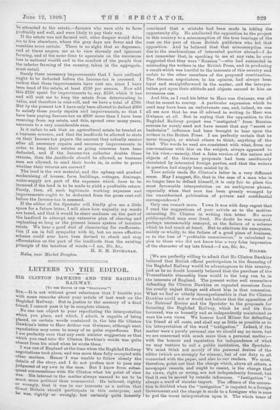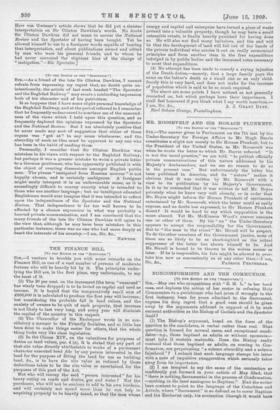LETTERS TO THE EDITOR.
SIR CLINTON DAWKINS AND THE BAGHDAD RAILWAY.
rrO TUN ED/TOR OF TEM "erscrAvon."1
Szu,—It is not without great reluctance that I trouble you with some remarks about your article of last week on the Baghdad Railway. But in justice to the memory of a dead friend, I cannot pass it by in complete silence.
No one can object to your repudiating the interpretation Which you place, and which, I admit, is capable of being Placed, on certain words contained in the late Sir Clinton Dawkina's letter to Herr Arthur von Gwinner, although such repudiation may seem to many of us quite superfluous. But I am perfectly sure that any such sinister suggestion as that Which you read into Sir Clinton Dawkins's words was quite absent from his mind when be wrote them.
I was out of England at the time when the Baghdad Railway negotiations took place, and was more than fully occupied with other matters. Hence I was unable to follow closely the details of the story, and I do not profess now to pass any Judgment of my own in the case. But I know from subse- quent conversations with Sir Clinton what his point of view Was. His interest in the matter always seemed to me to be much more political than commercial. He believed, rightly cr wrongly, that it was in our interests as a nation that Great Britain should participate in this enterprise, and be was, rightly or wrongly, but certainly quite honestly
convinced that a mistake had been made in letting the opportunity slip. He attributed the opposition to the project in this country to a misconception of the true bearings of the case on the part of those British publicists who led that opposition. And he believed that that misconception was due to the machinations of interested parties abroad—I do not remember that, in speaking to me at any rate, he ever suggested that they were "Russian "—who had succeeded in misleading the writers in the British Press, and in producing a result which was hurtful to the interests of this country and unfair to the other members of the proposed combination. The German negotiators, in his opinion, had always been loyal and straightforward in the matter, and the interpre- tation put upon their attitude and objects seemed to him an erroneous one.
And this, as I read his letter to Herr von Gwinner, was all that he meant to convey. A particular expression which he used may have been an unfortunate one, and, indeed, we can all see now that he was ill advised in writing to Herr von Gwinner at all. But in saying that the opposition to the Baghdad Railway project was "instigated" from Russian sources he surely need not have meant that any "secret or backstairs" influence had been brought to bear upon the writers in the British Press. I am perfectly certain that he never thought, or wished others to think, anything of the kind. The words he used are consistent with what, from my conversations with him on the subject, always appeared to be his view,—namely, that a false version of the nature and objects of the German proposals had been assiduously circulated by interested foreign parties, and that the writers in question had simply been misled by it.
Your article reads Sir Clinton's letter in a very different sense. May I suggest, Sir, that in the case of a man who is no longer here to defend himself, it is only fair. to place the most favourable interpretation on an ambiguous phrase, especially when that man has been grossly wronged by the unauthorised publication of private and confidential correspondence?
Only one remark more. I own it was with deep regret that I read the suggestions of your article as to the motives animating Sir Clinton in writing this letter. No more public-spirited man ever lived. No doubt he was annoyed. perhaps unreasonably annoyed, at the failure of a scheme which he bad much at heart. But to attribute his annoyance, mainly or wholly, to the failure of a good piece of business, or to the loss of "profitable commissions," is calculated to give to those who did not know him a very false impression of the character of my late friend.—I am, Sir, &c., [We are perfectly willing to admit that Sir Clinton Dawkins believed that British official participation in the financing of the Baghdad Railway would be advantageous to this country, just as he no doubt honestly believed that the purchase of the Transatlantic steamship lines would in the long run be in the interests of England. The present writer well remembers defending Sir Clinton Dawkins on repeated occasions from the cruelly unjust things said about him in that connexion. What we find so utterly incomprehensible is that Sir Clinton Dawkins could not or would not believe that the opposition of the National Review and the Spectator to the proposals for financing the Baghdad Railway, which he and his firm favoured, was as honestly and as independently maintained as were his own views. We honour Lord Milner for defending his friend at all costs, and shall say as little as possible as to his interpretation of the word " instigation." Indeed, if the mutter were a purely personal one we should say no more, but we are concerned with much more than a personal matter,— with the honour and reputation for independence of what we may venture to call a public institution, the Spectator. We must think not merely of the personal desires of the editor (which are strongly for silence), but of our duty to all connected with the paper, and also to our readers. We must, therefore, point out that the charge which, above all others, a newspaper resents, and ought to resent, is the charge that its views, right or wrong, are not independently formed, but that it can be moved by outside influences. "Instigation" is always a word of sinister import. The offence of the accusa- tion is doubled when the " instigation " is imputed to a foreign Government and the charge is made to a foreigner who is sure to put the worst interpretation upon it. The whole tenor of
Herr von Gwinner's article shows. that he did put a sinister interpretation on Sir Clinton Da.wk ins's words. No doubt Sir , Clinton Dawkins did not mean to accuse the National Review and the Spectator of having been bought. Yet he allowed himeelf to use to a foreigner words capable of bearing that interpretation, and about publications owned and edited by men who were his personal friends, and to whom he had never conveyed the slightest hint of the charge of "instigation."—'ED. Spectator.]











































 Previous page
Previous page